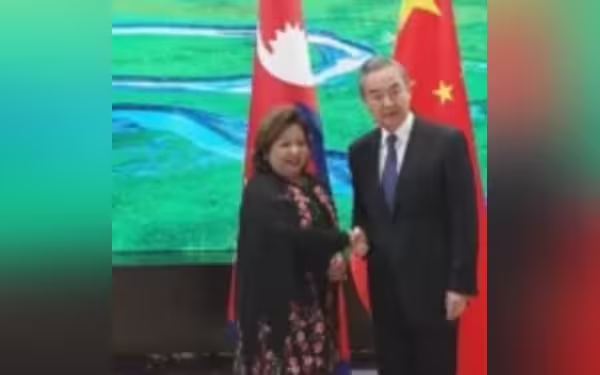Sunday, December 22, 2024 08:03 AM
China And Nepal Strengthen Bilateral Ties Through Cooperation
- China and Nepal enhance ties under Belt and Road Initiative.
- Nepal reaffirms commitment to one-China policy.
- Discussions focus on trans-Himalayan connectivity network.
 Image Credits: pakistantoday
Image Credits: pakistantodayChina and Nepal enhance bilateral relations, focusing on connectivity and cooperation under the Belt and Road Initiative.
In a significant diplomatic engagement, Chinese Foreign Minister Wang Yi and Nepalese Foreign Minister Arzu Rana Deuba convened in Chengdu, China, to discuss the enhancement of bilateral relations. This meeting comes at a time when both nations are keen on strengthening their ties, particularly under the framework of the Belt and Road Initiative, which aims to improve infrastructure and connectivity across Asia.
During the discussions, Wang Yi emphasized the importance of collaboration on various fronts, highlighting the need for progress in building a trans-Himalayan multi-dimensional connectivity network. This initiative is expected to facilitate trade and cultural exchanges between China and Nepal, fostering a deeper partnership as they approach the 70th anniversary of their diplomatic relations next year.
Arzu Rana Deuba reaffirmed Nepal's commitment to the one-China policy, stating that Nepal will not permit any external forces to use its territory for activities that could undermine China's interests. This statement underscores Nepal's strategic position in the region and its desire to maintain a stable relationship with its powerful neighbor.
Furthermore, Deuba expressed Nepal's appreciation for China's vision of a community with a shared future for mankind. He indicated Nepal's willingness to engage in the Global Development Initiative, which aims to promote sustainable development and cooperation among nations.
In a related context, a spokesperson from the Chinese mainland addressed the ongoing travel restrictions imposed by Taiwan's Democratic Progressive Party (DPP). The spokesperson criticized the DPP for blaming the mainland for travel obstructions, pointing out that the DPP has been responsible for banning mainland residents from visiting Taiwan since 2020. This has led to significant disruptions in cross-Straits travel, affecting both tourism and personal connections.
As of now, the mainland has taken steps to resume travel for residents of Fujian Province to the islands of Kinmen and Mazu, processing thousands of travel permit applications. This move reflects a broader intention to enhance exchanges and cooperation across the Taiwan Strait, provided that the DPP ceases its restrictive measures.
The discussions between China and Nepal signify a pivotal moment in their diplomatic relations, with both countries eager to explore new avenues for cooperation. As they celebrate their long-standing ties, the commitment to mutual respect and shared development goals will be crucial in navigating the complexities of regional politics. The evolving dynamics in the region, particularly concerning Taiwan, will also play a significant role in shaping future interactions among these nations.













